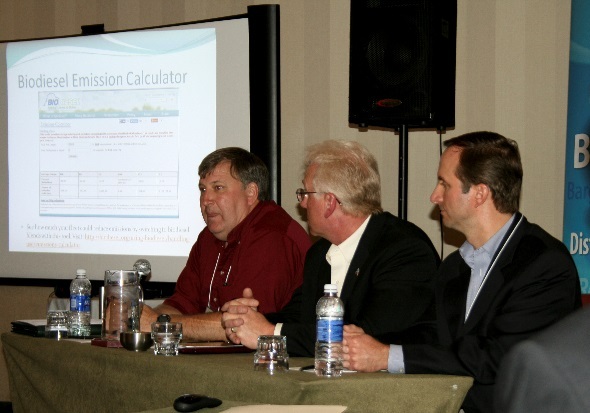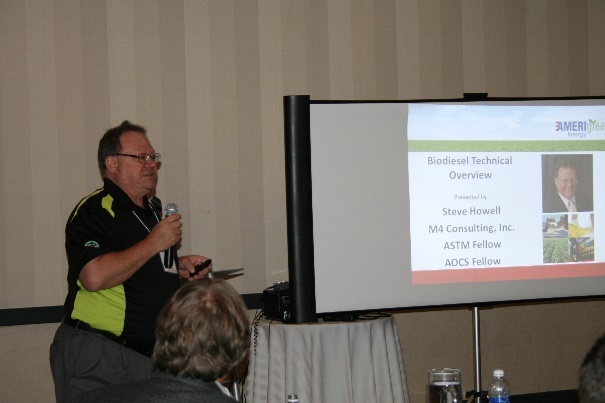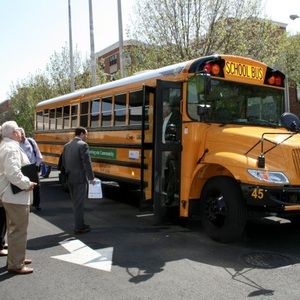'Fleet Footprint' event hosted by Amerigreen Energy this spring




Photo: Amerigreen Energy
June 2, 2016
BY Amerigreen Energy
Amerigreen Energy, in conjunction with Clean Cities of New Jersey and Pennsylvania, hosted “The Fleet Footprint Event: Emissions Requirements and the New Energy Landscape,” in Morristown, New Jersey, this spring. The event presented an honest assessment of all transportation fuels and energy so fuel dealers and their fleet customers can use the information to make smart, cost-effective decisions in order to support new emissions goals.
With so much uncertainty facing the energy industry, change is the only constant. The event represented all alternative fuel technologies taking root in the diesel space.
Attendees learned from and interacted with industry experts and experienced fleet managers. They presented options and first-rate content to incorporate existing equipment to navigate the changes and avoid unexpected costs as they adapt in the face of impending emissions mandates, such as U.S. EPA's greenhouse gas (GHG) emissions reduction requirements. Feedback from attendees and participants was overwhelmingly positive. Plans are being made to extend the program reach to educating additional fleets in the region.
“We hope the event represents a launching point for dealers to continue to grow their relationship with their local market becoming a resource for their customers as they work to comply with emerging emissions standards,” said Steve McCracken, Amerigreen CEO of energy services. “The requirements are coming. Positioning dealers as a local resource and engaging with fleets is the best way to remain ahead of the changes to successfully guide customers through the experience with new equipment and energy. This guidance is key to preserving the composition of local commercial relationships.”
Advertisement
The event started with an alternative fuels overview from the Clean Cities directors of New Jersey and Pennsylvania with an overview of their national and state-specific programs, as well as alternative fuels options available for fleets to reduce dependency on foreign oil and lower emissions.
Steve Howell, NBB senior technical advisor, presented a compelling technical overview of biodiesel. He included a chemical breakdown of the fuel, the history of the ASTM quality specs, importance of food and fuel, and which major vehicle manufacturers have approved their equipment for 20 percent blends of biodiesel (B20). Download his presentation and webinar.
“When you grow a crop of soybeans, that soybean is 80 percent high-protein meal, which feeds humans and animals…and it is 20 percent oil,” Howell said. “That oil was an excess commodity.” As more of this protein is grown throughout the world, the oil will always come as a result. “The more fuel we make, the cheaper food gets,” Howell added. This is different than other fuel types such as ethanol and some of the other alternative fuels. Soybeans are not grown specifically for biodiesel—it comes as a result of growing it for feeding animals and humans.
Advertisement
The program also included two panel discussions from fleet users and managers. First, biodiesel industry leaders presented their experiences in using biodiesel within their own businesses. The audience learned about the benefits and challenges they dealt with when introducing biodiesel to their fleets. When talking to his customers about using biodiesel, Ross Enterprises Vice President of Operations Rob Griscom’s mantra is, “You have to try it. See it for yourself.” He’s such a fan of biodiesel that he uses it for his personal and company vehicles after doing rigorous testing.
On the second panel, propane autogas, CNG and electric vehicle representatives shared their experiences integrating alternative fuels into their own businesses and helping others make the transition. Valuable first-hand lessons were shared to benefit attendees as they consider alternative fuel options.
The event, held April 21, concluded with an alternative energy vehicles expo. On display were a biodiesel-powered school bus, biodiesel Jeep, propane autogas bi-fuel truck, and electric cars. Attendees could kick the tires, talk with vehicle owners, and see first-hand the alternative energy technologies currently available.
See the full event recap and presentations here: http://www.amerigreen.com/fleet-footprint-event-recap/.
Related Stories
Aemetis Inc. on April 23 announced that its subsidiary in India, Universal Biofuels, has been working with the U.S. government to support the success of American interests in India. U.S. Consul General Jennifer Larson recently toured the facility.
Heritage Aviation, along with Avfuel Corp.—a leading independent supplier of aviation fuel and services—is proud to announce the introduction of sustainable aviation fuel (SAF) to Patrick Leahy Burlington International Airport (KBTV).
CARB on April 4 released a third set of proposed changes to the state’s LCFS. More than 80 public comments were filed ahead of an April 21 deadline, including those filed by representatives of the ethanol, biobased diesel and biogas industries.
The Oregon Department of Environmental Quality on April 18 proposed to delay the 2024 annual report deadline for the state’s Clean Fuels Program due to a cyberattack and extended outage of the Oregon Fuels Reporting System.
The Washington Senate on April 15 voted 25 to 23 in favor of legislation that aims to update the state’s Clean Fuels Standard, setting more ambitious carbon reduction goals that would require a 45% reduction in greenhouse gas (GHG) emissions by 2038.
Upcoming Events










